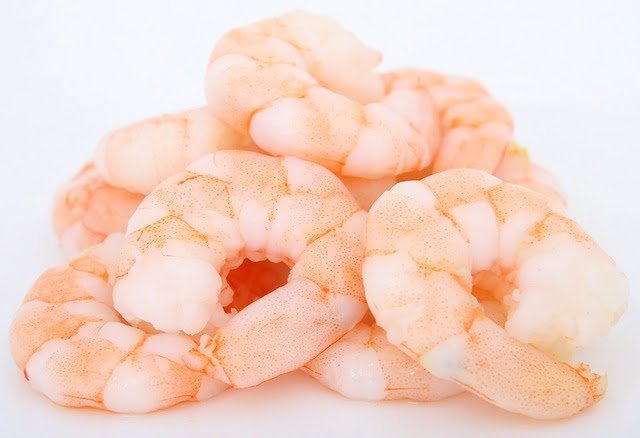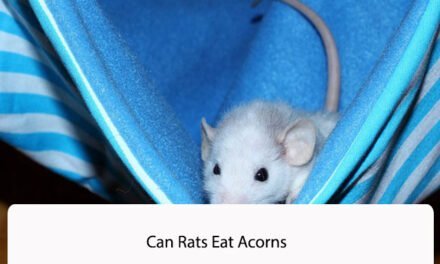Rats are known to be omnivores, which means they eat both plant and animal-based foods. As pet owners, it’s important to know what foods are safe and healthy for our furry friends. One question that often comes up is whether rats can eat shrimp.
The answer is yes, rats can eat shrimp. Shrimp is a good source of protein and contains essential nutrients such as omega-3 fatty acids, vitamin B12, and selenium. However, it’s important to note that shrimp should only be given to rats in moderation as a treat, and not as a regular part of their diet.
It’s also important to make sure the shrimp is fully cooked and free of any seasoning or additives, as these can be harmful to rats. Additionally, if you’re feeding your rat shrimp for the first time, it’s a good idea to start with a small amount to make sure they don’t have any adverse reactions. Overall, while rats can eat shrimp, it should be given in moderation and as part of a balanced diet.

Overview of Rats’ Diet
Rats are omnivorous creatures, which means they eat both plant and animal-based foods. In the wild, rats will eat whatever they can find, including fruits, vegetables, grains, insects, and small animals. However, domesticated rats have a more controlled diet, which is usually provided by their owners.
Rats require a balanced diet to maintain good health, just like any other animal. Their diet should consist of a combination of protein, carbohydrates, and fats. It’s also important to provide them with essential vitamins and minerals, such as calcium, phosphorus, and vitamin D.
When it comes to protein, rats can eat a variety of animal-based foods, including chicken, beef, fish, and eggs. They can also eat some dairy products, such as yogurt and cheese. However, it’s important to note that rats are lactose intolerant, so they should not consume large amounts of dairy.
Carbohydrates are also an important part of a rat’s diet. They can eat a variety of grains, such as oats, barley, and rice. They can also eat fruits and vegetables, such as apples, carrots, and broccoli.
Finally, rats require a certain amount of fat in their diet. They can get this from animal-based foods, such as chicken and beef, as well as from nuts and seeds.
Overall, rats require a balanced diet that includes a variety of protein, carbohydrates, and fats, as well as essential vitamins and minerals. It’s important to provide them with a healthy and varied diet to ensure they stay healthy and happy.
Can Rats Eat Shrimp?
We have often heard that rats can eat almost anything. However, it is important to understand what kind of food is healthy for them and what can harm them. One of the questions that frequently arise is whether rats can eat shrimp or not.
Shrimp is a type of seafood that is high in protein and low in fat. It is also a good source of vitamins and minerals, such as vitamin B12, iron, and phosphorus. However, despite its nutritional value, it is not recommended to feed shrimp to rats.
Rats are omnivores and can eat a variety of foods, including fruits, vegetables, grains, and meat. However, they are not adapted to eating seafood, and consuming it can cause health problems. Shrimp can contain high levels of cholesterol and sodium, which can lead to heart and kidney problems in rats.
In addition, shrimp can also contain harmful bacteria and parasites that can cause food poisoning in rats. These can lead to symptoms such as diarrhea, vomiting, and dehydration, which can be fatal in severe cases.
In conclusion, while rats can eat a variety of foods, including meat, it is best to avoid feeding them seafood such as shrimp. It is important to provide them with a balanced diet that meets their nutritional needs and keeps them healthy.
Nutritional Value of Shrimp
Shrimp are a popular seafood delicacy that are enjoyed by many people around the world. They are a great source of nutrition and offer several health benefits. Here are some of the key nutritional facts about shrimp:
- Shrimp are low in calories, with just 84 calories per 3-ounce serving.
- They are high in protein, with 18 grams of protein per 3-ounce serving.
- Shrimp are a good source of omega-3 fatty acids, which are important for heart health.
- They are also rich in vitamins and minerals, including vitamin B12, phosphorus, and selenium.
In addition to being a great source of nutrition, shrimp are also versatile and can be prepared in a variety of ways. They can be grilled, baked, boiled, or fried, and can be used in a wide range of dishes, from salads to stir-fries.
It is important to note that while shrimp are generally considered to be a healthy food, they can be high in cholesterol. However, research has shown that the cholesterol in shrimp is not as harmful as once thought, and that moderate shrimp consumption can be part of a healthy diet.
Overall, shrimp are a nutritious and delicious food that can be enjoyed as part of a healthy diet.

Potential Risks of Feeding Shrimp to Rats
While shrimp can be a tasty treat for rats, there are some potential risks to be aware of before feeding them to your furry friends. Here are a few things to keep in mind:
High Cholesterol Content
Shrimp are high in cholesterol, which can be a concern for rats with certain health conditions. Rats with heart disease or high cholesterol levels should avoid eating shrimp altogether. If you’re unsure about your rat’s cholesterol levels, it’s best to consult with a veterinarian before feeding them shrimp.
Parasites and Bacteria
Shrimp can contain parasites and bacteria that may be harmful to rats. To minimize the risk of infection, it’s important to properly clean and cook the shrimp before feeding them to your rats. Raw or undercooked shrimp should be avoided at all costs.
Allergic Reactions
Just like humans, rats can have allergic reactions to certain foods. If you’ve never fed your rat shrimp before, it’s a good idea to introduce them to it slowly and monitor them for any signs of an allergic reaction. Symptoms of an allergic reaction may include itching, swelling, and difficulty breathing.
High Sodium Content
Shrimp are also high in sodium, which can be problematic for rats with certain health conditions. Rats with kidney disease or high blood pressure should avoid eating shrimp. If you’re unsure about your rat’s sodium levels, it’s best to consult with a veterinarian before feeding them shrimp.
Overall, while shrimp can be a tasty treat for rats, it’s important to be aware of the potential risks before feeding them to your furry friends. By taking the necessary precautions and monitoring your rat’s health, you can safely incorporate shrimp into their diet as an occasional treat.
How to Safely Feed Shrimp to Rats
When it comes to feeding rats, it’s important to know what foods are safe for them to eat. Shrimp can be a nutritious addition to a rat’s diet, but it’s important to know how to feed it to them safely.
First, it’s important to note that rats should only be fed cooked shrimp. Raw shrimp can contain harmful bacteria that can make your rat sick. Make sure to cook the shrimp thoroughly before feeding it to your rat.
Additionally, it’s important to remove the shell and tail from the shrimp before feeding it to your rat. The shell and tail can be difficult for rats to digest and can cause digestive issues.
When feeding shrimp to your rat, it’s important to do so in moderation. Shrimp should not make up a large portion of your rat’s diet and should be fed as a treat rather than a staple food.
It’s also important to monitor your rat’s reaction to the shrimp. If your rat experiences any digestive issues or allergic reactions, discontinue feeding them shrimp and consult with a veterinarian.
Overall, feeding cooked shrimp to your rat can be a safe and nutritious addition to their diet as long as it’s done in moderation and with caution.
Alternatives to Shrimp in Rats’ Diet
When it comes to feeding rats, there are several alternatives to shrimp that can provide similar nutritional benefits. Here are some options to consider:
1. Chicken
Chicken is a great source of protein and can be a good alternative to shrimp in a rat’s diet. It is also readily available and easy to prepare. You can either cook it or feed it raw, depending on your preference. Just make sure to remove any bones before feeding it to your rat.
2. Tofu
Tofu is another good source of protein that can be used as an alternative to shrimp. It is also low in fat and calories, making it a good option for rats that are prone to obesity. Tofu can be fed raw or cooked, but make sure to avoid giving your rat any tofu that has been seasoned or flavored with spices or sauces.
3. Eggs
Eggs are a good source of protein and can be a great alternative to shrimp in a rat’s diet. They can be fed boiled, scrambled, or raw, depending on your preference. However, make sure to avoid giving your rat any eggs that have been seasoned or flavored with spices or sauces.
4. Fish
Fish can be a good source of protein and omega-3 fatty acids for rats. However, not all types of fish are safe for rats to eat, so make sure to do your research before feeding your rat any fish. Some good options include cod, salmon, and trout.
Overall, there are several alternatives to shrimp that can provide similar nutritional benefits for rats. Just make sure to do your research and consult with a veterinarian before making any changes to your rat’s diet.
Conclusion
In conclusion, rats can eat shrimp, and it is safe for them to do so in moderation. Shrimp is a good source of protein, vitamins, and minerals, and can provide a healthy addition to a rat’s diet.
However, it is important to note that rats should not be fed shrimp exclusively, as they require a balanced diet that includes a variety of other foods. Additionally, it is important to ensure that the shrimp is cooked and properly prepared to avoid any potential bacterial contamination.
Overall, including shrimp as a small part of a rat’s diet can be a healthy and enjoyable addition, but it should not be relied upon as the sole source of nutrition. As always, it is important to consult with a veterinarian or animal nutritionist to ensure that your rat is receiving a balanced and healthy diet.

Frequently Asked Questions
Are shrimp safe for rats to eat?
Yes, rats can eat shrimp in moderation. Shrimp is a good source of protein and other nutrients that are beneficial for rats’ health. However, it is important to note that shrimp should not be a staple in their diet, as rats need a balanced diet that includes a variety of foods.
Can rats safely consume cooked seafood?
Yes, rats can safely consume cooked seafood, including shrimp. However, it is important to avoid giving them seafood that has been seasoned or cooked with garlic or onion, as these can be toxic to rats.
What types of fish can rats eat?
Rats can eat a variety of fish, including salmon, tuna, and cod. It is important to ensure that the fish is cooked and boneless before feeding it to rats, as bones can be a choking hazard.
Can rats eat chicken instead of seafood?
Yes, rats can eat chicken as an alternative to seafood. Chicken is a good source of protein and other nutrients that are beneficial for rats’ health. However, it is important to ensure that the chicken is cooked and boneless before feeding it to rats.
Is it safe for pet rats to eat seafood?
Yes, it is generally safe for pet rats to eat seafood in moderation. However, it is important to ensure that the seafood is cooked and boneless before feeding it to rats, as bones can be a choking hazard. Additionally, it is important to avoid giving them seafood that has been seasoned or cooked with garlic or onion, as these can be toxic to rats.
Are there any foods that rats should avoid eating?
Yes, there are some foods that rats should avoid eating, including chocolate, caffeine, alcohol, and anything that is high in sugar or salt. Additionally, rats should not be fed any foods that are toxic to them, such as avocado, raw beans, and raw sweet potato. It is important to research and consult with a veterinarian before introducing any new foods to a rat’s diet.




